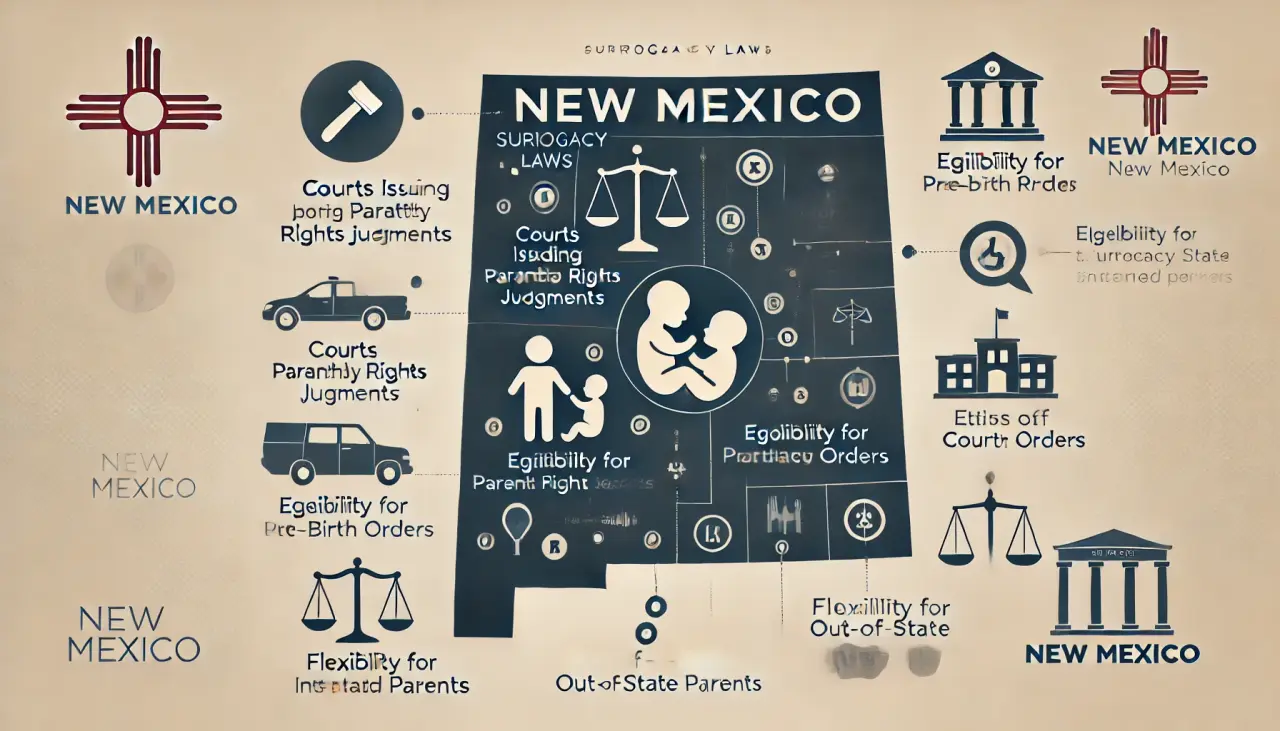
New Mexico Surrogacy Laws: Parental Rights, Pre-Birth Orders, and LGBTQ Surrogacy
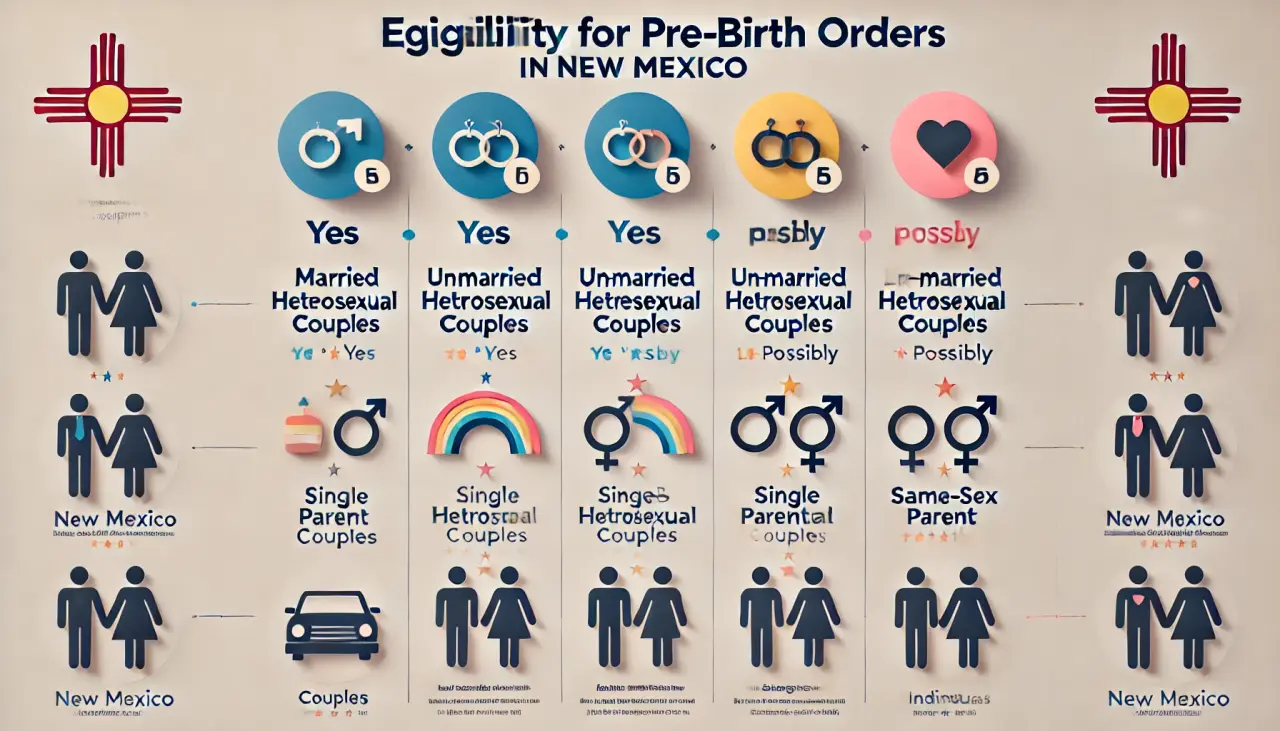
Pre-Birth Order in New Mexico Surrogacy Laws
Will New Mexico courts approve a pre-birth order for heterosexual couples?
Yes, they will. Until recently, the initial birth certificate listed the gestational carrier (surrogate mother) as the mother. However, with cooperation from the newborn records department, courts now directly list both intended parents’ names on the initial birth certificate.
Can intended parents who have at least one genetic connection to the child be declared legal parents in a pre-birth order?
- Married heterosexual couples using their own eggs and sperm: Yes.
- Married heterosexual couples using donated eggs or sperm: Yes.
- Unmarried heterosexual couples using their own eggs and sperm: Yes, though it may vary by judge.
- Unmarried heterosexual couples using donor eggs or sperm: Yes, similar to married couples.
- LGBTQ couples using their own eggs or sperm: Yes.
- Single individuals using their own eggs or sperm: Possibly, though the legal framework for single parents in surrogacy cases in New Mexico is still unclear. This is because New Mexico surrogacy laws typically do not allow for a second parent on the birth certificate to replace the surrogate mother. Furthermore, New Mexico’s public policy is generally against removing parental financial responsibility in the absence of a second legal parent.
If neither intended parent has a genetic connection to the child, can both parents be declared legal parents in a pre-birth order?
- Married heterosexual couples: Yes.
- Unmarried heterosexual couples: Yes.
- Same-sex couples: Yes.
- Single individuals: Possibly, but this remains uncertain under New Mexico law. Adoption is an alternative, but it requires the surrogate mother to sign a relinquishment of parental rights after legal consultation and before a judge.
Which court in New Mexico can issue a parental rights judgment?
The court that issues the parental rights judgment will be based on the location of the child’s birth, the intended parents’ residence, or the temporary location of the child.
Will the outcome of a parental rights judgment vary by court location?
Historically, yes. However, with recent changes, it is expected that the results will now be more consistent.
Can intended parents request to change the court location for the parental rights decision?
No, New Mexico does not allow a motion to change the court location. However, intended parents can file a mandatory challenge to a specific judge, or they can choose to stay in a county of their choice, which may influence the court’s jurisdiction.
Is a hearing required to obtain a pre-birth order in New Mexico?
No, New Mexico judges have the discretion to issue a parental rights order without a hearing. If a hearing is scheduled, the judge will determine whether the intended parents must appear in person or if their lawyers can represent them.
Can intended parents who do not reside in New Mexico still obtain a pre-birth order in New Mexico if the surrogate gives birth there?
Yes, as long as the child is born in New Mexico.
Will New Mexico’s newborn records department respect pre-birth orders from other states?
Yes, but they may require the order to be registered within New Mexico before it is recognized.
How long does it typically take to obtain a birth certificate after a child is born in New Mexico?
Usually within two weeks, though the process can be expedited.
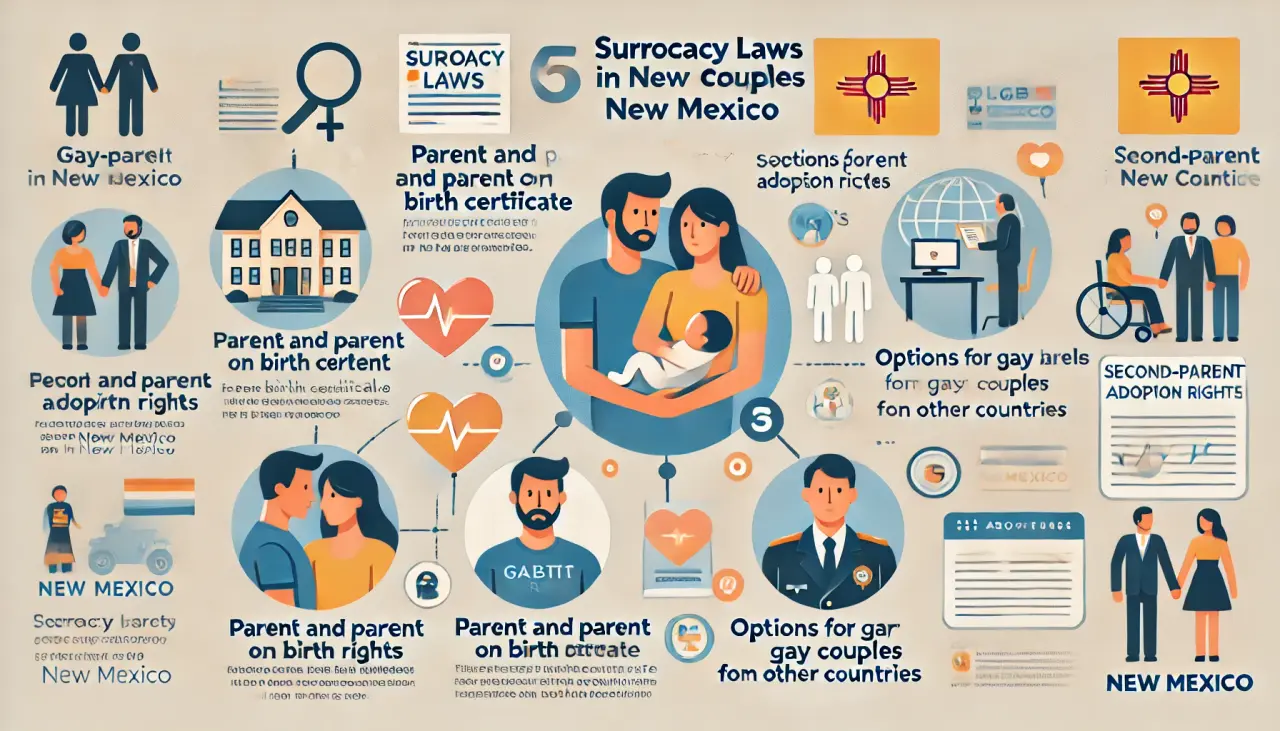
Surrogacy for LGBTQ Couples in New Mexico
How will LGBTQ parents be named on the final birth certificate?
The birth certificate will list both parents, using the term “parent and parent.”
Can gay male couples from other countries receive a birth certificate that only lists the genetic father and the surrogate mother?
Yes, they can.
Can gay male couples from other countries later receive a birth certificate that only lists one or both fathers, without mentioning the surrogate mother?
Yes, this is possible. It is easier to list two fathers because New Mexico’s surrogacy laws do not explicitly require one parent to be removed to make room for the other, which sometimes presents a problem in surrogacy policies.
Can a non-biological parent in an LGBTQ couple acquire second-parent adoption rights based on the child’s birth in New Mexico, even if the intended parents do not live there?
Yes, a second-parent adoption can be granted.
If a second-parent adoption is not possible, will New Mexico’s newborn records department respect second-parent adoption orders from other states and add the second parent to the birth certificate?
Yes, but the adoption order may need to be recognized within New Mexico before the second parent is added to the birth certificate.
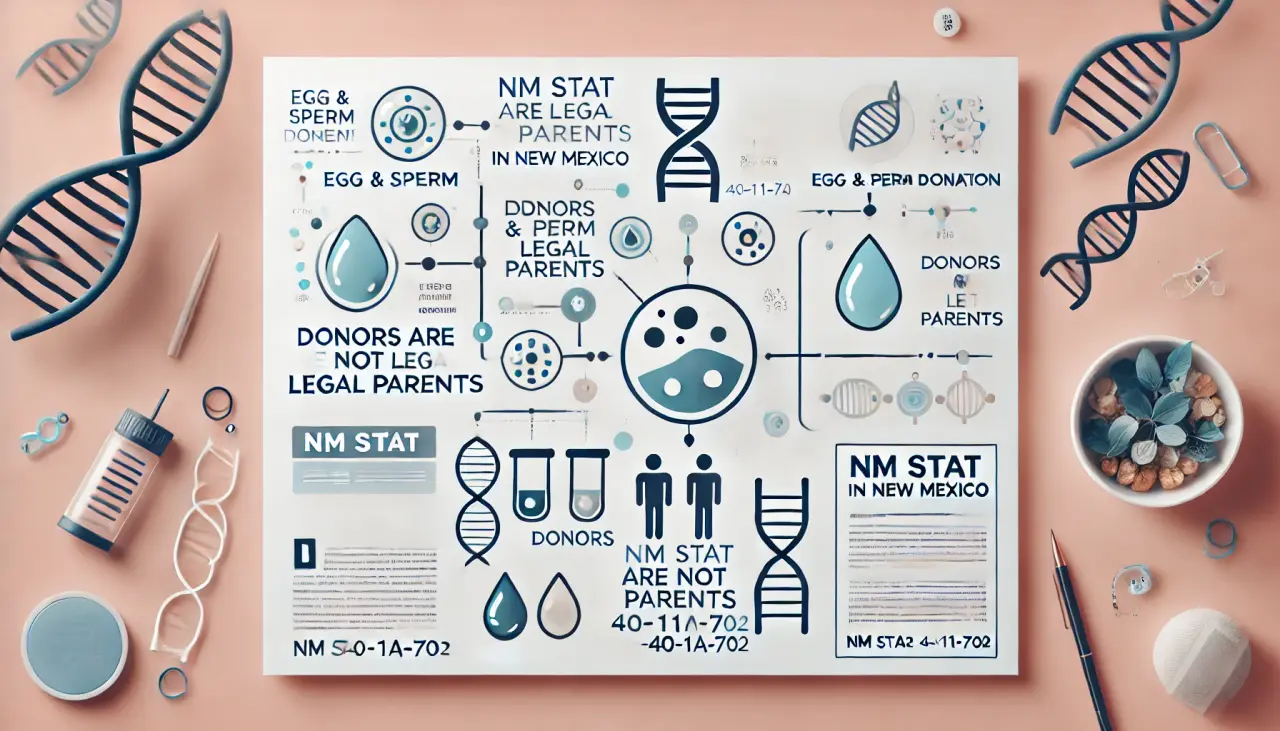
Egg and Sperm Donation in New Mexico Surrogacy
Are there any laws or case law in New Mexico regarding the rights of egg, sperm, or embryo donors?
Yes, according to NM Stat § 40-11A-702 (2013), donors of eggs, sperm, or embryos are not considered legal parents of children conceived through assisted reproductive technologies.
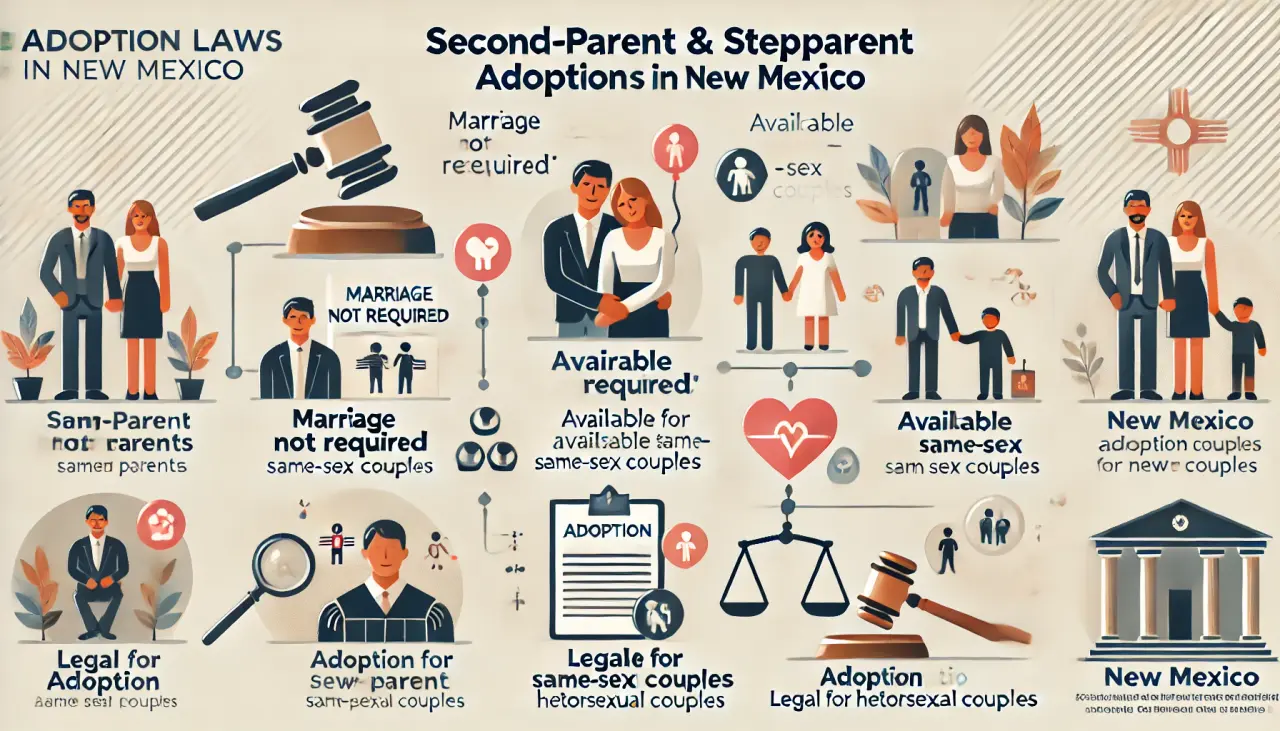
Second-Parent and Stepparent Adoption in New Mexico
Can a New Mexico court approve second-parent or stepparent adoptions for heterosexual couples residing in the state?
Yes, second-parent and stepparent adoptions are possible.
Do both spouses need to be married to adopt a child as second parents or stepparents in New Mexico?
No, marriage is not a requirement for second-parent or stepparent adoption in New Mexico.
Can same-sex couples in New Mexico adopt a child as second parents or stepparents?
Yes, same-sex couples can pursue second-parent or stepparent adoption in New Mexico.
Is marriage required for same-sex couples to adopt as second parents or stepparents in New Mexico?
No, marriage is not required.
Traditional Surrogacy in New Mexico
While New Mexico does not explicitly prohibit traditional surrogacy, any payments made to the traditional surrogate must comply with strict adoption laws. Furthermore, a traditional surrogate’s parental rights can only be relinquished through adoption. In certain cases, intended parents may have to share custody and pay child support.